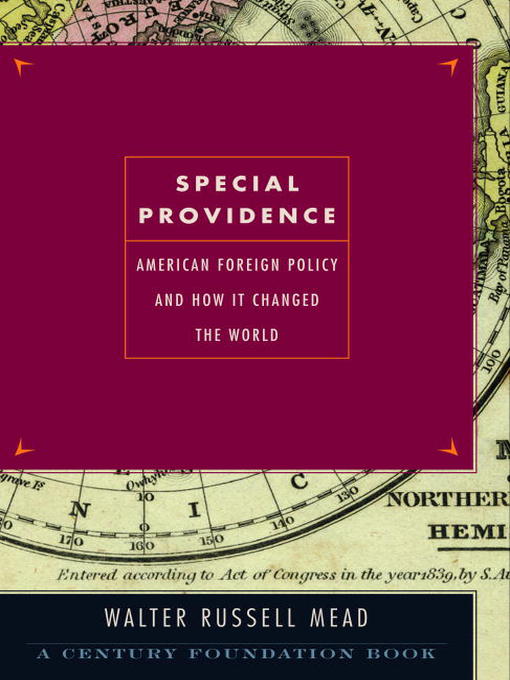
Special Providence
American Foreign Policy and How It Changed the World
- اطلاعات
- نقد و بررسی
- دیدگاه کاربران
نقد و بررسی

October 22, 2001
America is perceived as not having a foreign policy tradition, contends Mead (Mortal Splendor: The American Empire in Transition), a senior fellow at the Council on Foreign Relations. In fact, Mead contends, there are actually four contrasting schools of foreign policy: a "Hamiltonian" concern with U.S. economic well-being at home and abroad; a "Wilsonian" impulse to promulgate U.S. values throughout the world; a "Jeffersonian" focus on protecting American democracy in a perilous world; and a bellicose, populist "Jacksonian" commitment to preserving U.S. interests and honor in the world. As Mead's detailed historical analysis of the origin and development of these schools shows, each has its strengths and faults—if Wilsonians are too idealistic, Jacksonians are too suspicious of the world—but each keeps the other in check, assuring no single school will dominate and that a basic consensus among them will be achieved, as was the case during the Cold War. As the Cold War ended, however, and the world became more complex, consensus ended. Hamiltonians and Wilsonians saw the opportunity to mold the economy and morality of the world in the U.S. image, but Jeffersonian doubt about foreign action in places like Bosnia, and Jacksonian popular suspicions of organizations like the WTO soon challenged such grandiose plans. Mead worries that U.S. foreign policy is too unfocused today and suggests we could learn much from the interactions in the past of the four schools, a complex history he ably unfolds. 8 pages of photos not seen by PW. (Nov. 8) Forecast:With foreign policy at the forefront after September 11, this could help shape discussions of U.S. response; expect serious interest.

November 1, 2002
A senior fellow for foreign policy at the Council on Foreign Relations, Mead (Mortal Splendor: The American Empire in Transition) follows in the footsteps of Walter McDougall in Promised Land, Crusader State (Houghton, 1997). Like McDougall, he points out that the United States-contrary to the received wisdom-was awash in diplomacy from its birth throughout the supposedly isolationist 19th century. But Mead sets himself a broader task. Why, he asks, does the United States still suffer from a reputation for naivet despite its meteoric ascent to world power? The author traces European puzzlement at Americans' stubborn independence, aversion to state power, and obsession with commerce. Like other historians, Mead discerns several schools of thought that vie for supremacy within the American diplomatic tradition: Hamilton's preoccupation with commerce, Jefferson's watchfulness over the Republic's founding principles, Jackson's obsession with military strength, and Wilson's pursuit of a just world order. The beneficial interplay of these principles, says Mead, has yielded the most successful foreign policy in history. Largely celebratory and sure to be controversial, this work belongs in all library collections.-James R. Holmes, Ph.D. Candidate, Fletcher Sch. of Law & Diplomacy, Tufts Univ., Medford, MA
Copyright 2002 Library Journal, LLC Used with permission.

November 15, 2001
Since September 11, foreign policy has been front-page news. Mead, a Council on Foreign Relations senior fellow, argues that foreign policy has consistently played a more important role in U.S. politics than most studies recognize and that "American thinking about foreign policy has been relatively stable." But this stability does not reflect simplicity: Mead sees U.S. foreign policy as determined by the interaction of four approaches he labels Hamiltonian, Wilsonian, Jeffersonian, and Jacksonian. Hamiltonians are globalists who urge a business-government alliance. Wilsonians accept global responsibility to build a peaceful, law-abiding community of democratic nations as a matter of moral duty as well as national interest. Jeffersonians are skeptical; they want to preserve democracy at home but aren't anxious to spread it. Populist Jacksonians see foreign policy's goal as protecting the American people economically and militarily. Mead traces these tendencies through history, demonstrating how they have been balanced through the political process and suggesting how they could be balanced in the future.(Reprinted with permission of Booklist, copyright 2001, American Library Association.)




دیدگاه کاربران